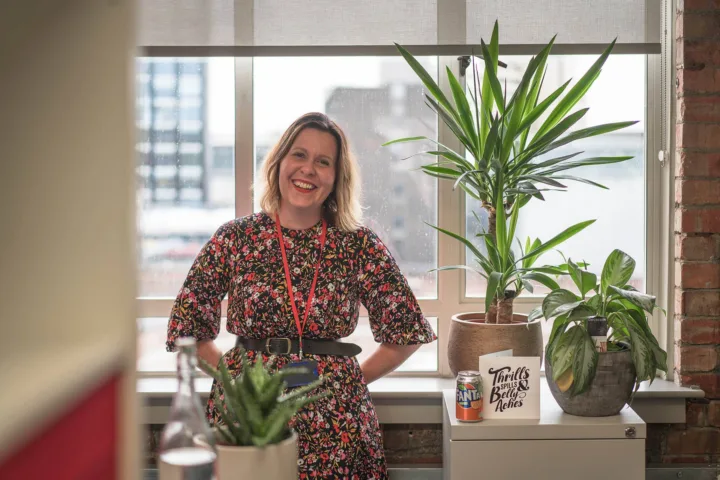Where does artificial intelligence add genuine value to business? It’s a question Richard Corderoy, our CEO, looked to answer on a recent webinar with Rashad Issa CQP FCQI, Chair of the CQI Board of Trustees and host of the Chartered Quality Institute’s Quality Impact Podcast.
As ever, Richard brought his no-nonsense home truths to the conversation, which you can catch up on below. AI and business topics they dived into include:
- What it really means to “liberate data” in the age of AI
- Why hype-driven adoption can lead to more headaches than headlines
- How organisations can get back to basics to unlock genuine business value from AI
True to form, his trademark mix of practical insight, a dash of scepticism, and the occasional hammer analogy kept the discussion around AI for business grounded in real-world experience.
“Let’s stop looking for things to hit with the AI hammer – and start with what actually adds value.”
Richard Corderoy, CEO of Oakland Everything Data
No More AI Fairytales
If you’ve been to any conference lately, you’ve probably heard the AI hype machine in full swing.
- “It’s the future!”
- “It’ll change everything!”
- “If you’re not doing it, you’re already behind!”
Richard says, “Honestly, I think we’ve lost our heads a bit. Everyone started with, ‘I have a hammer, what can I hit?’ and, funnily enough, that causes a lot of mess and not much actual value.”
For Oakland Everything Data, we believe the question isn’t “Should we do AI?”. It’s “Why do we need it, and what are we trying to achieve?”.
Value First – Start at the End
Oakland’s mantra is simple: start with value. We’re so passionate about value that it is one of our five principles for creating lasting data impact.
“None of this matters until someone makes a better decision, a customer gets a better service, or a process actually changes for the better,” Richard explains. “So let’s start at the end – what do you want to achieve – and work backwards from there.”
That means AI isn’t the starting point. It’s a tool, one of many, to help solve a business problem. And in Oakland’s experience, most of the time the real blockers aren’t technological at all. They’re about messy processes, unclear ownership, or bad governance.
Why AI Projects Stumble
When asked what’s holding big firms back, Richard doesn’t hesitate: “Data complexity. Even mid-sized organisations are drowning in it. They’ve tried a few tech fixes, maybe moved to the cloud, but haven’t got the full value they expected. Then AI comes along with all this promise – and panic sets in.”
He sees it often: the fear of being left behind meets uncertainty about where to start. Add pressure to spend wisely, and you’ve got a recipe for half-baked experiments that never make it to production.
Agentic AI – The “Smart Intern” Approach
One of Richard’s favourite concepts is Agentic AI – not a giant all-knowing brain, but a network of small, specialised AI “agents” that each do one job well.
“Think of them as smart interns. You wouldn’t hire 50 people to read and categorise all your product descriptions, but you can get a couple of agents to do that. They’re not free but they’re a lot cheaper than a human team.”
Richard Corderoy, CEO of Oakland Everything Data
The trick? String these agents together so they can collaborate much like people in a process and let them handle repetitive, time-heavy work so humans can focus on higher-value thinking.
A Real-World Example
Richard shares a client project he’s particularly proud of. A large sales organisation needed to recategorise tens of thousands of products into new business-defined categories.
“The old way? Interns Googling products, reading PDFs, updating records… and then doing it all again 50,000 times. Painful.”
Instead, Oakland built a team of AI agents:
- One read and extracted existing product data.
- Another searched supplier websites.
- Another analysed documents.
- A “coordinator” agent pulled the inputs together and made the final categorisation.
The result? Accuracy jumped to 98%, manual effort dropped drastically, and the process now runs automatically for every new product.
“It’s not about perfection. If a human team had a 5–10% error rate, we’d accept it. So why demand 100% from a system? Set sensible tolerances and move on.”
Richard Corderoy, CEO of Oakland Everything Data
Governance Without Red Tape
Richard is clear: governance matters, but it can’t become a three-year paperwork exercise.
“We’ve all seen those rooms with shelves of process binders no one looks at. That’s governance done wrong. The right level of governance depends on what you’re governing and the risk involved. And you can improve governance while delivering value, you don’t have to wait years before you start.”
Use our blog to understand more about data governance in the age of AI.
Ethics – Don’t Hold AI to a Higher Standard than People
When the conversation turns to AI ethics, Richard challenges a common double standard: “We say we don’t want bias in AI, but every human decision-maker has bias shaped by where they’re from, their education, their experience. AI shouldn’t get a free pass, but let’s not pretend bias is new.”
Oakland’s approach is to help clients define what “ethical” means for them, pick use cases with manageable risk, and design governance around that.
Richard’s Advice for Businesses Feeling Overwhelmed
1. Stop talking about AI as if it’s one thing.
Decide what type of AI you’re talking about and why it matters to you.
2. List your biggest problems without a tech person in the room.
Then figure out which ones could be solved with AI.
3. Accept “good enough” in the right contexts.
Perfection is a luxury, value comes from speed and integration.
4. Build in small steps.
Prove value early, then scale.
“It’s like electricity – when it first came along, the lightbulbs were rubbish, but the potential was huge. We didn’t throw it out, we found the right applications. AI’s the same. It’s not magic – it’s just another tool. Let’s use it properly.”
Richard Corderoy, CEO of Oakland Everything Data
“It’s like electricity – when it first came along, the lightbulbs were rubbish, but the potential was huge. We didn’t throw it out, we found the right applications. AI’s the same. It’s not magic – it’s just another tool. Let’s use it properly.”
Richard Corderoy, CEO of Oakland Everything Data
For all of Richard’s wisdom, please watch or listen to the full webinar. And to understand how we can support practical AI for your business, please contact our friendly team.


